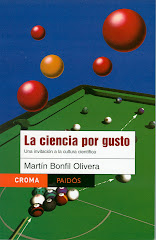By Martín Bonfil Olivera
Published on Milenio Diario, July 22, 2009
Last week I argued in this space against the lack of scientific culture that is so evident in so many aspects of our society.
Among the different responses I received, a letter from a reader from
She proposed that my concept of "scientific inculture" is an inadequate simplification. She asks whether the mystical or magical beliefs of the "native people" of
A lot of these folk beliefs are based in the respect for the environment, and have survival and preservation value, although they are not science-based. On the contrary, often the environment suffers in the name of science.
So, how desirable is scientific culture; how harmful are absurd beliefs?
I should clarify that when I spoke about absurd beliefs I had in mind things like quackery, horoscopes, indigo children or quantum healing. There are a lot of examples of, for instance, efficient traditional therapies —and others that are completely useless, of course— and folk environmental practices that work better than modern proposals… though not always.
My reader questioned also whether it makes any sense to demand a scientific culture from a population with a high proportion of poor and excluded people, without the means to consult not an astrologer, but a decent health system.
She is right: to foster scientific culture is utopic. But the fact that problems such as poverty or injustice exist does not imply that spreading scientific culture is a worthless task. These are problems that have to be taken in parallel.
I agree with my reader that "the concept of scientific inculture makes reference to a complex and multidimensional historical, political and social process".
Even so, I insist that a widely spread scientific culture in our population can be the first step for the development of a scientific, technological and industrial system that, in the medium term, will help obtain a better life for our peoples.
(translated by Adrián Robles Benavides) To receive Science for pleasure weekly
in your email, subscribe here!






No comments:
Post a Comment